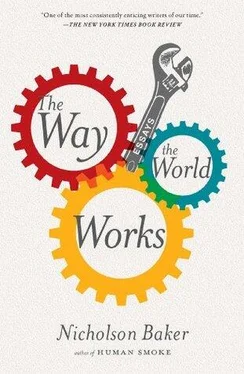Nicholson Baker - The Way the World Works
Здесь есть возможность читать онлайн «Nicholson Baker - The Way the World Works» весь текст электронной книги совершенно бесплатно (целиком полную версию без сокращений). В некоторых случаях можно слушать аудио, скачать через торрент в формате fb2 и присутствует краткое содержание. Год выпуска: 2012, Издательство: Simon & Schuster, Жанр: Публицистика, Критика, на английском языке. Описание произведения, (предисловие) а так же отзывы посетителей доступны на портале библиотеки ЛибКат.
- Название:The Way the World Works
- Автор:
- Издательство:Simon & Schuster
- Жанр:
- Год:2012
- ISBN:нет данных
- Рейтинг книги:4 / 5. Голосов: 1
-
Избранное:Добавить в избранное
- Отзывы:
-
Ваша оценка:
- 80
- 1
- 2
- 3
- 4
- 5
The Way the World Works: краткое содержание, описание и аннотация
Предлагаем к чтению аннотацию, описание, краткое содержание или предисловие (зависит от того, что написал сам автор книги «The Way the World Works»). Если вы не нашли необходимую информацию о книге — напишите в комментариях, мы постараемся отыскать её.
), here assembles his best short pieces from the last fifteen years.
The Way the World Works
OED
Modern Warfare 2
Through all these pieces, many written for
, and
, Baker shines the light of an inexpugnable curiosity.
is a keen-minded, generous-spirited compendium by a modern American master.
The Way the World Works — читать онлайн бесплатно полную книгу (весь текст) целиком
Ниже представлен текст книги, разбитый по страницам. Система сохранения места последней прочитанной страницы, позволяет с удобством читать онлайн бесплатно книгу «The Way the World Works», без необходимости каждый раз заново искать на чём Вы остановились. Поставьте закладку, и сможете в любой момент перейти на страницу, на которой закончили чтение.
Интервал:
Закладка:
That Saturday, my wife and I drove back to Jay to go to the spaghetti fund-raiser. We got there early, so that we could have a tour of Maine’s Paper & Heritage Museum, which is in a mansion on Church Street in Livermore Falls, where mill managers and their families once lived. The front walk is dug up now, because they’re installing a new community walkway and wheelchair ramp.
Walter Ellingwood and Norman Paradis, whose father and grandfather worked at the Otis Mill, and whose son now works at Andro, gave us the museum tour. Walter showed us the burst tester, and the opacity and absorption tester, and a piece of wood that helped you compute the speed of the paper machine — and the two of them pointed out the old steam whistle from the Otis Mill. Walter said that one night long ago he got lost in the swamp in Chesterville and they blew the steam whistle for him so that he could find his way home. Norm showed us a diagram of Andro, with light-up buttons, and he pointed out the medal that his father had gotten for working for International Paper for forty years. It had four diamonds, one for each decade. “He thought that was really really something from International Paper company. It didn’t take much to make these people say, ‘Jeez, look how nice that is.’” Norm himself also worked for forty years for International Paper, first as a kid in school, and eventually as a supervisor at Andro, with four hundred people under him. “These are some of my buckles that I won,” he said, showing us some metal pieces in a glass case. His grandfather, who came from Quebec, had worked in the Otis Mill barefoot, he said, because the chemicals ruined any shoes you wore.
We paused in front of an aerial photograph of the Otis Mill in winter. Norm pointed out the town’s skiing hill, just on the other side of the river. The old mill’s hydro plant had always powered the ski lifts; now, Norm said, he didn’t know what would happen. Then he and Walter had to hurry on over to work at the spaghetti event. We went there, too, to the Rose Church Parish Hall.
There were two other public fund-raisers happening in town that night, but even so, a good crowd came out to have the seven-dollar dinner. Mostly they were retired mill workers, but there were some who had just lost their jobs. Norm greeted everyone — he knew everyone. We sat next to two women who had, long ago, cleaned the offices at the mill. “You can’t be delicate eating spaghetti,” said one of the women — she was about seventy — when I wiped my mouth. There were two sculptures of saints on the walls, each nearly life-size.
Sherry Judd, the founder of the museum, a smiley woman with short curly hair who wore a western-style blue shirt, was serving spaghetti. Sherry worked at both Otis and Andro, and also at a paper mill in California, and her father was a mason at Otis Mill. She started raising money for the museum several years ago, she said. “I had a vision that someday there was not going to be papermaking in these towns,” she told me. “Somebody needs to tell the children about what their ancestors did, how hard they worked to develop this community and the communities around it.” For two years she raised money for the museum by towing around a caboose replica filled with papermaking artifacts and giving talks on the need to preserve the past. She had a video made, “Along the Androscoggin,” about the history of papermaking in the area, with good clips from mill workers, including Norm Paradis and his son. She wants people to walk into the museum and hear the sound of the papermaking machinery, and see how it worked. “I have a lot of ideas up here,” she said, tapping her head, “but we need a curator. And a grant writer.”
We bought some tickets for the quilt raffle and a brick to go into the museum’s new front walkway, and then we drove home talking about Sherry, Norm, Walter, and the skiing hill next to the river.
Don Carli, of the Institute for Sustainable Communication, told me that this year eighteen paper mills have closed in the United States, and more than thirty-four papermaking machines have been permanently put out of commission. Meanwhile, the power demand from the Internet is growing hugely. “If you do a simple extrapolation of the consumption of energy by data centers, we have a crisis,” Carli said. In 2006, the Energy Information Administration estimated that data centers consumed about 60 billion kilowatt hours of electricity — just the centers themselves, not the wireless or fiber-optic networks that connect them or the end-user computers that they serve — while paper mills consumed 75 billion kilowatt hours of electricity, of which more than half was green power from renewable sources. “And that was in 2006,” Carli said, “when print wasn’t kicked to the curb and declared all but dead and buried. It was still fighting the good fight.” Not only is there now a roughly comparable carbon footprint between server farms and paper mills, but the rate of growth in server and data center energy consumption is “metastasizing,” he said. “It doubled between 2000 and 2005, and it’s due to double again at current rates by 2010.” That’s one reason why gigantic data centers are now going up far away from cities, Carli added. “You can’t go to ConEd and get another ten megawatts of power. You can buy the computers, you can buy the servers. You just can’t get juice for them, because the grid is tapped out.”
“That’s kind of amazing,” I said.
“So when we start thinking about transforming more and more of our communication to digital media,” Carli said, “we really do have to be asking, Where will the electrons come from?”
I nodded and looked out at the trees.
(2009)
Google’s Earth
I’m fond of Google, I have to say. I like Larry Page, who seems, at least in the YouTube videos I’ve watched, shy and smart, with salt-and-pepper bangs; and Sergey Brin, who seems less shy and jokier and also smart. Ken Auletta, the author of an absorbing, shaggy, name-droppy book called Googled: The End of the World As We Know It, doesn’t seem to like either of them much — he says that Page has a “Kermit the Frog” voice, which isn’t nice, while Brin comes off as a swaggering, efficiency-obsessed overachiever who, at Stanford, aced tests, picked locks, “borrowed” computer equipment from the loading dock, and once renumbered all the rooms in the computer science building. “Google’s leaders are not cold businessmen; they are cold engineers,” Auletta writes — but “cold” seems oddly wrong. Auletta’s own chilliness may be traceable in part to Brin’s and Page’s reluctance to be interviewed. “After months of my kicking at the door, they opened it,” he writes in the acknowledgments. “Google’s founders and many of its executives share a zeal to digitize books,” he observes, “but don’t have much interest in reading them.”
They’ll probably give more than a glance at Googled . I read the book in three huge gulps and learned a lot — about Google’s “cold war” with Facebook, about Google’s tussles with Viacom, about Google’s role in the “Yahoo-Microsoft melee,” and about Google’s gradual estrangement from its former ally Apple. Auletta is given to martial similes and parallels, from Prince Metternich in nineteenth-century Europe to Afghanistan now: “Privacy questions will continue to hover like a Predator drone,” he writes, “capable of firing a missile that can destroy the trust companies require to serve as trustees for personal data.” And he includes some revealing human moments: Larry Page, on the day of Google’s hugely successful stock offering, pulls out his cell phone and says, “I’m going to call my mom!”
But what Auletta mainly does is talk shop with CEOs, and that is the great strength of the book. Auletta seems to have interviewed every media chief in North America, and most of them are unhappy, one way or another, with what Google has become. Google is voracious, they say, it has gargantuan ambitions, it’s too rich, it’s too smug, it makes big money off of O.P.C. — other people’s content. One unnamed “prominent media executive” leaned toward Auletta at the 2007 Google Zeitgeist Conference and whispered a rhetorical question in his ear: What real value, he wanted to know, was Google producing for society?
Читать дальшеИнтервал:
Закладка:
Похожие книги на «The Way the World Works»
Представляем Вашему вниманию похожие книги на «The Way the World Works» списком для выбора. Мы отобрали схожую по названию и смыслу литературу в надежде предоставить читателям больше вариантов отыскать новые, интересные, ещё непрочитанные произведения.
Обсуждение, отзывы о книге «The Way the World Works» и просто собственные мнения читателей. Оставьте ваши комментарии, напишите, что Вы думаете о произведении, его смысле или главных героях. Укажите что конкретно понравилось, а что нет, и почему Вы так считаете.












